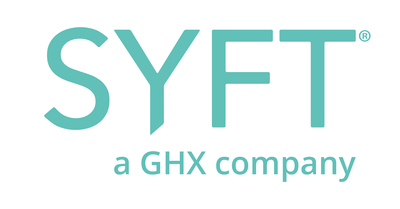63% of Hospital Leaders Say There is Clear ROI for Supply Chain Analytics Yet Almost Half Use Manual Processes to Manage Supply Chain Data

STRATFORD, Conn., March 7, 2019 /PRNewswire/ — Eighty-seven percent of hospital leaders believe supply chain management can improve margins by more than one percent, and 86 percent believe it can improve care quality. Despite this clear return on investment, almost half of respondents admitted to using manual processes like spreadsheets that do not have the ability to perform sophisticated or proactive analyses.

This is according to the findings of a new survey conducted by Sage Growth Partners on behalf of Syft®, a leading national provider of inventory control and end-to-end supply chain cost management software and services. The survey of 100 hospital leaders* involved in supply chain management (SCM) was conducted to evaluate how SCM is prioritized, managed, and leveraged as a strategic business function.
Download the full report here. Key findings include:
SCM is a priority but doesn’t drive investment
- Almost every respondent said SCM is a medium (33%) or high (65%) priority. However, only 13 percent named it as their highest operational investment priority.
- The top operational investment priorities for 2019 were identified as: patient throughput (24%), process improvement (21%), perioperative environment (15%), staffing turnover, retention, and management (15%), SCM (13%), and other (12%).
There is clear ROI for supply chain analytics across cost and quality
- The majority (86%) believe improving SCM would improve care quality, however, 27 percent say their hospital has not yet used SCM data analytics to identify ways to improve quality.
- Almost all respondents (98%) say better SCM can improve hospital margins: 52 percent say better SCM can increase margins by 1-3 percent, and 35 percent believe it can increase margins by more than 3 percent.
- The majority (63%) say there is clear ROI for supply chain analytics and the large majority (97%) believe supply chain analytics can positively impact their organizations’ costs. Other areas where supply chain analytics is perceived to have positive impact include: value-based care (67%), quality (60%), staff satisfaction/retention (45%), patient outcomes (43%), and regulatory adherence (37%).
Some organizations aren’t analyzing their supply chain at all, and existing SCM solutions fall short on performing higher-level analytics
- Organizations are using an array of different SCM approaches, including in-house solutions (39%), their EHR (16%), a third-party solution (19%), and outside consultants (7%). Two in five (19%) don’t analyze their supply chain at all.
- Three-quarters of respondents report using their SCM solutions for basic analytic functions such as tracking inventory (76%) or consolidating suppliers (71%).
- The ability for current solutions to perform more advanced functions were less frequently cited: accessing data on case cost in the operating room (OR) (57%), identifying and managing expired supplies (50%), surgeon supply use variance (42%), other (3%).
In the OR, many are using low-tech approaches to analytics and resistance to change is the top barrier
- Specific to OR procedures, 37 percent use Excel or other Microsoft tools to track margins per case. Twenty-seven percent use other low-tech tools, don’t know if they track OR margins, or do not track those margins. Thirty-six percent use a specific technology solution to track OR margins.
- Surgeon allegiances to vendors/supplies was cited as the top barrier to reducing supply chain waste in the OR. Other barriers included: clinical staff lacking time to consider supplies pre- and post-procedure (No. 2), missing the right technology or workflows (No. 3), and staff resistance to change (No. 4).
“As we move towards value-based care models, hospitals are facing increasing pressures on their margins, and on their ability to deliver quality care,” said Todd Plesko, Syft’s CEO. “It’s amazing that while the large majority of survey respondents believe SCM can improve costs and care quality, fewer say they’re actually deploying advanced supply chain analytics to take advantage of that potential impact, which presents a major missed opportunity. Hospital leaders are going to need to use every tool in their toolbox to succeed, and they will need to turn the supply chain into a strategic business lever – not only to save money, but to improve clinician satisfaction, patient outcomes, and the care patients receive.”
*Methodology
Sage Growth Partners was commissioned by Syft® to survey 100 hospital leaders responsible for managing the supply chain in February 2019. Survey respondents identified as: VP/Director of supply chain or materials management (23%), VP/Director of perioperative or OR services (22%), CFO (19%), other C-suite (14%), CNO (10%) and other (12%). The majority of respondents (80%) were in hospitals with less than 500 beds, and 65 percent were part of an integrated delivery network.
About Sage Growth Partners
Sage Growth Partners accelerates commercial success for healthcare organizations through a singular focus on growth. The company helps its clients thrive amid the complexities of a rapidly changing marketplace with deep domain expertise and an integrated application of research, strategy, and marketing.
Founded in 2005, Sage Growth Partners is located in Baltimore, MD and serves clients such as Philips Healthcare, Quest Diagnostics, Launchpoint, Ingenious Med, and ArborMetrix. Visit us online at www.sage-growth.com.
About Syft® (Formerly Management Health Solutions)
Syft® enables enterprise-wide inventory management through a powerful combination of services, automation tools, and real-time data analytics. The comprehensive Syft Synergy® platform eliminates the need for multiple point solutions and facilitates immediate supply savings with a range of capabilities including master data management, inventory services, supply chain management software, analytics, and advanced reporting. Founded in 1999, Syft is used by more than 500 U.S. hospitals and health systems to control costs, processes, and productivity across the entire organization. For more information, visit Syft at www.syftco.com.
Media Contact
Vanessa Ulrich
(410) 534.1161
vulrich@sage-growth.com
![]() View original content to download multimedia:http://www.prnewswire.com/news-releases/63-of-hospital-leaders-say-there-is-clear-roi-for-supply-chain-analytics-yet-almost-half-use-manual-processes-to-manage-supply-chain-data-300808562.html
View original content to download multimedia:http://www.prnewswire.com/news-releases/63-of-hospital-leaders-say-there-is-clear-roi-for-supply-chain-analytics-yet-almost-half-use-manual-processes-to-manage-supply-chain-data-300808562.html
SOURCE Syft

